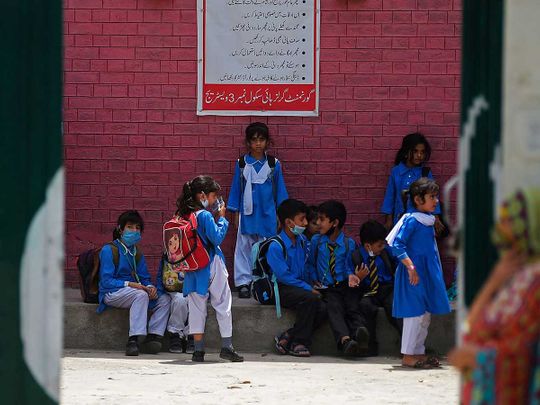
Islamabad: Pakistan is in the grip of a blistering heatwave, which has led to an increase in heatstroke cases, diarrhoea, and cholera in different parts of the country.
Several cases of acute kidney injury caused by heatstroke, acute water diarrhoea and gastroenteritis have been reported especially in Sindh and Punjab, local media reported.
Heatstroke is a medical emergency that can cause death if not taken care of. Pakistan’s National Institute of Health (NIH) described it as a form of hyperthermia in which the body temperature is elevated rapidly resulting in the failure of the sweating mechanism and making the body unable to cool down. The normal body temperature is around 98.6 degrees Fahrenheit and with heatstroke, the body can warm up to 106 degrees F or higher in 10 to 15 minutes.
Two children died from heatstroke in a village in the Dadu district of Sindh. Parents in worst-hit regions requested the government to shut down schools during the intense summer days. “The government must consider closing schools during this worst heatwave. Children can easily become dehydrated as temperatures are peaking above 40C every day” said Najma Absar, an Islamabad resident.
Health officials also warned of an increase in the cases of water-borne diseases during peak summers. A deadly cholera outbreak linked to contaminated drinking water has already infected thousands of people in central Pakistan. Cholera cases were first identified in Pir Koh, a remote mountainous town in Dera Bugti district of Balochistan, on April 17, and later also reported in the coastal city of Karachi.
Temperates hit 51C in Pakistan
Temperatures in parts of Pakistan have reached record levels in recent weeks with 51 degrees Celsius recorded in Jacobabad in Sindh province this weekend. Water shortages and frequent power cuts have worsened the situation making the heat unbearable, and leading to a health crisis. The extreme heat has also threatened crops, increased fire risks, and flooding from melting glaciers, Pakistan Met Office said.
Climate Change taskforce and health advisory
Pakistan has been enduring a relentless and lethal heatwave since late April. The country is the eighth-most vulnerable country to extreme weather caused by climate change. Prime Minister Shehbaz Sharif has constituted a task force to chalk out a comprehensive plan to mitigate the impacts of climate change.
Health officials warned residents to remain indoors and stay hydrated. The NIH has issued separate advisories for citizens and educational institutions, detailing measures to be taken to protect them from the prevailing heatwave. Education institutions were asked to set up heatstroke centres and spread awareness among students and staff on how to recognize and treat heat-related illnesses. The use of artificial shading such as canopies, tents, sails, and umbrellas in outdoor play spaces was suggested. The advisory also urged educational institutions to increase the number of water coolers to help students stay hydrated and also ensure that electric fans were in working condition












